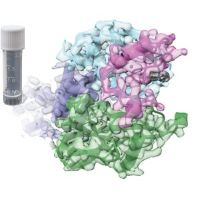Specification
| Organism | Homo sapiens (Human) |
| Expression Host | E.coli |
| Tag Info | Tag-Free |
| Purity | Greater than 95% as determined by SDS-PAGE. |
| Uniprot ID | P09919-2 |
| Uniprot Entry Name | |
| Gene Names | CSF3 |
| Alternative Names | Granulocyte Colony-Stimulating Factor; G-CSF; Pluripoietin; Filgrastim; Lenograstim; CSF3; C17orf33; GCSF |
| Expression Region | Partial of Isoform 2 (31-204aa) |
| Molecular Weight | 18.8 kDa |
| Endotoxin | Less than 1.0 EU/µg as determined by LAL method. |
| Sequence | TPLGPASSLPQSFLLKCLEQVRKIQGDGAALQEKLCATYKLCHPEELVLLGHSLGIPWAPLSSCPSQALQLAGCLSQLHSGLFLYQGLLQALEGISPELGPTLDTLQLDVADFATTIWQQMEELGMAPALQPTQGAMPAFASAFQRRAGGVLVASHLQSFLEVSYRVLRHLAQP |
| Product Form | Lyophilized powder (Lyophilized from a 0.2 μm Filtered 10 mM HAc-NaAc, 150 mM NaCl, 0.004% Tween 80, 5% Mannitol, pH 4.0) |
| Reconstitution | Please reconstitute protein in deionized sterile water and we recommend that briefly centrifuge thevial prior to opening the vial .We recommend aliquot for long-term storage at -20℃/-80℃. |
Background
| Relevance | Human Granulocyte-Colony-Stimulating Factor (G-CSF) is 20 kD glycoprotein containing internal disulfide bonds. It induces the survival, proliferation, and differentiation of neutrophilic granulocyte precursor cells and it functionally activates mature blood neutrophils. Among the family of colony-stimulating factors, G-CSF is the most potent inducer of terminal differentiation to granulocytes and macrophages of leukemic myeloid cell lines. The synthesis of G-CSF can be induced by bacterial endotoxins, TNF, Interleukin-1, and GM-CSF. Prostaglandin E2 inhibits the synthesis of G-CSF. In epithelial, endothelial, and fibroblastic cells secretion of G-CSF is induced by Interleukin-17. |
| Function | |
| Involvement in disease | |
| Subcellular Location | |
| Protein Families | |
| Tissue Specificity | |
| Pathway |
QC Data
| Note | Please contact us for QC Data |
| Product Image (Reference Only) |  |

